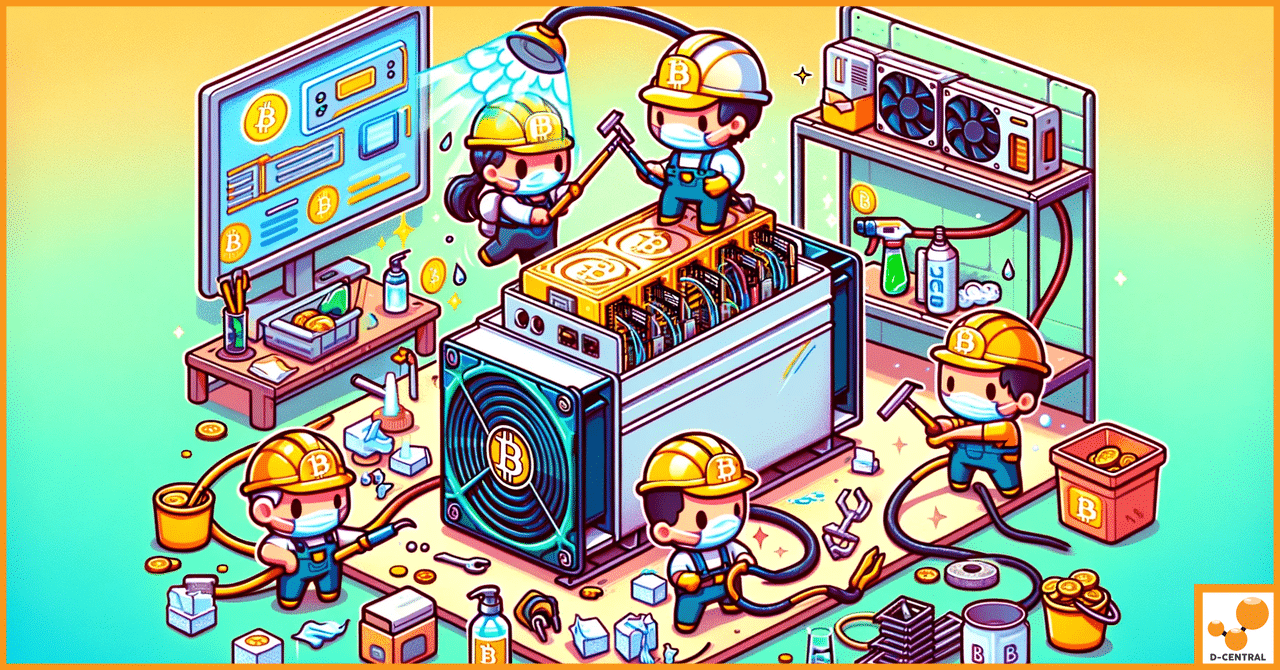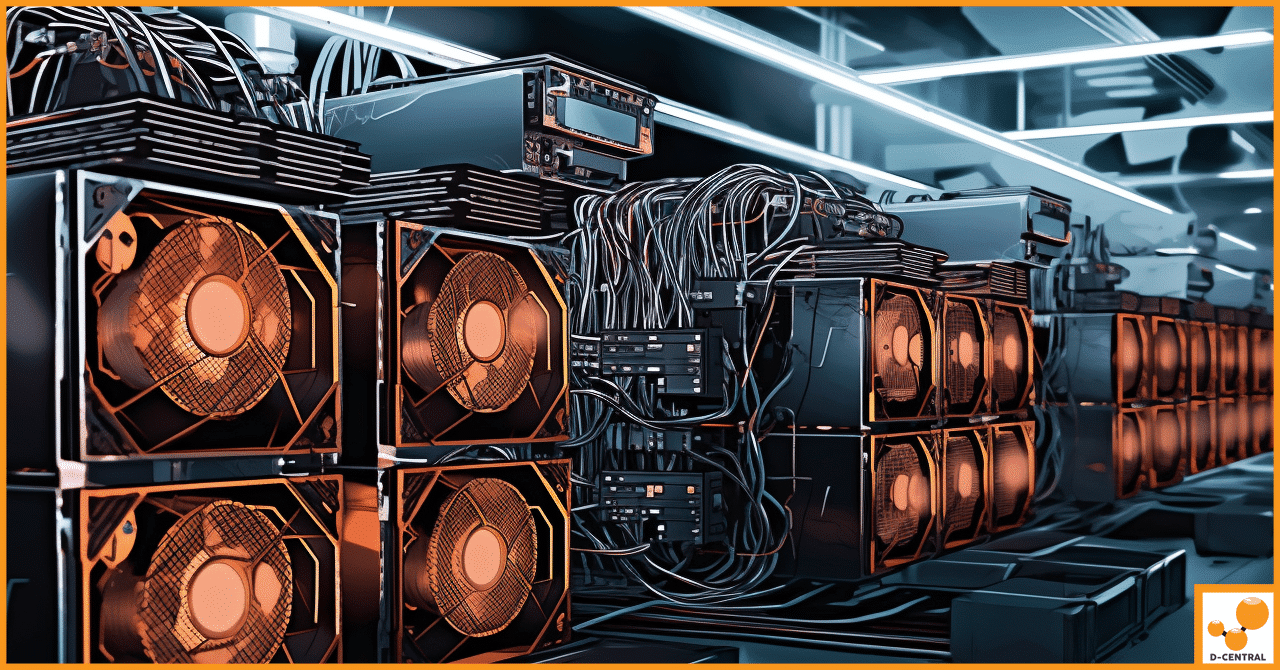
On-Site Antminer Repairs: How to Maintain Your Hardware Within Manufacturer Standards
In the intricate world of Bitcoin mining, the efficiency and longevity of mining hardware stand as pivotal factors that directly
4479 Desserte Nord Autoroute 440, Laval, QC H7P 6E2

In the rapidly evolving world of cryptocurrency mining, Application-Specific Integrated Circuit (ASIC) miners have emerged as pivotal tools for miners aiming to achieve efficiency and profitability. Unlike their predecessors, such as CPUs, GPUs, and FPGAs, ASIC miners are designed with a singular focus: to mine cryptocurrencies with unparalleled precision and speed. This specialization allows them to excel at cracking complex cryptographic puzzles, thereby validating transactions and securing blockchain networks. As a result, ASIC miners have become the backbone of cryptocurrency mining operations, particularly for leading cryptocurrencies like Bitcoin.
However, the superior performance of ASIC miners comes with its own set of maintenance challenges. The intense computational processes they perform generate significant amounts of heat, which can lead to overheating and reduced efficiency if not properly managed. Moreover, the accumulation of dust and debris in the mining environment can further exacerbate these issues, potentially leading to hardware failure and costly downtime. Therefore, regular cleaning and cooling of ASIC miners are not just recommended practices but essential components of a successful mining operation. These maintenance activities ensure that miners operate within optimal temperature ranges, maintain their hash rates, and extend their operational lifespan.
This article delves into the critical aspects of maintaining ASIC miners, focusing on effective strategies for cleaning and cooling. We will explore the importance of creating a conducive environment for your miners, the step-by-step process of cleaning, the various cooling solutions available, and how regular maintenance can enhance the longevity and profitability of your mining equipment. By adhering to these best practices, miners can safeguard their investment and continue to thrive in the competitive landscape of cryptocurrency mining.
An ASIC (Application-Specific Integrated Circuit) miner is a specialized piece of hardware designed exclusively for cryptocurrency mining. Unlike general-purpose computing devices such as CPUs (Central Processing Units) and GPUs (Graphics Processing Units), ASIC miners are engineered to perform the singular task of mining a specific cryptocurrency algorithm with unmatched efficiency and speed. This focus allows them to solve cryptographic puzzles necessary for blockchain transactions at a much faster rate than their multi-purpose counterparts, making them indispensable assets in the competitive field of cryptocurrency mining.
The advent of ASIC miners marked a significant evolution in mining technology, offering a leap in processing power and energy efficiency. Each ASIC miner is tailored to mine cryptocurrencies based on a particular hashing algorithm, such as SHA-256 for Bitcoin or Scrypt for Litecoin. This specialization not only maximizes the miner’s output but also significantly reduces the power consumption per unit of cryptocurrency mined, thereby increasing profitability for miners in an industry where margins can be slim.
The high-performance operation of ASIC miners, however, generates considerable heat, which if not effectively managed, can reduce the miner’s efficiency, lead to hardware degradation, or even cause complete system failures. The compact, densely packed nature of ASIC miners also makes them susceptible to dust and debris accumulation, further exacerbating cooling challenges and impacting their operational lifespan.
Regular cleaning and cooling are therefore critical to maintaining an ASIC miner’s efficiency and durability. Proper maintenance ensures that:
In summary, the role of ASIC miners in the cryptocurrency mining industry cannot be overstated, with their specialized capabilities driving the efficiency and profitability of mining operations. However, to fully leverage these advantages, miners must commit to regular maintenance, particularly cleaning and cooling, to ensure these powerful devices continue to operate at their peak performance.
Before diving into the maintenance of your ASIC miner, it’s crucial to prepare adequately to ensure both your safety and the safety of the equipment. Proper preparation not only facilitates a smoother maintenance process but also prevents potential damage to the miner and personal injury.
Having the right tools and materials at hand is essential for effective maintenance. Here’s a list of tools commonly required for cleaning and cooling ASIC miners, along with their purposes:
Selecting high-quality tools and materials is crucial for several reasons:
In summary, preparing for ASIC miner maintenance involves prioritizing safety, gathering the necessary high-quality tools and materials, and understanding the purpose of each tool. This preparation is the foundation of effective maintenance that ensures the longevity and optimal performance of your ASIC miner.
Maintaining the cleanliness of your ASIC miner is crucial for its efficiency and longevity. Dust and debris can significantly impact performance, making regular cleaning a necessity. Here’s how to approach both external and internal cleaning, ensuring your miner remains in top condition without causing any damage.
Cleaning your ASIC miner, both externally and internally, is a delicate process that requires attention to detail and patience. By following these steps, you can ensure your miner remains in optimal condition, free from dust and debris that could hinder its performance. Regular maintenance not only prolongs the life of your miner but also maintains its efficiency and profitability in the competitive world of cryptocurrency mining.
Effective cooling is essential for maintaining the performance and longevity of ASIC miners. Given the high computational power of these devices, they generate significant heat, which, if not properly managed, can lead to decreased efficiency, hardware damage, or even failure. Understanding and optimizing the cooling of your ASIC miner is therefore crucial.
ASIC miners are equipped with built-in cooling mechanisms designed to dissipate the heat generated during operation. The primary components of these cooling systems include:
These cooling systems are designed to work under typical operating conditions. However, in environments where ambient temperatures are high or airflow is restricted, additional cooling strategies may be necessary.
Improving air circulation within your mining setup can significantly enhance the efficiency of built-in cooling systems. Here are some strategies for optimizing airflow:
For mining operations in particularly hot climates or confined spaces, aftermarket cooling solutions can provide additional relief:
The ambient environment plays a significant role in the effectiveness of your ASIC miner’s cooling system:
By understanding the built-in cooling mechanisms of ASIC miners and taking steps to optimize airflow and consider environmental factors, miners can significantly improve the cooling efficiency of their equipment. In challenging conditions, exploring advanced cooling solutions can provide the additional cooling capacity needed to maintain optimal performance and protect your investment in ASIC mining technology.
To ensure the longevity and optimal performance of ASIC miners, establishing a regimen of regular maintenance and diligent monitoring is essential. This proactive approach not only helps in maximizing the efficiency of your mining operation but also in preventing potential downtimes and hardware failures.
A well-defined maintenance schedule is crucial for the upkeep of ASIC miners. Here’s a recommended framework:
Adjust this schedule based on your specific operational conditions and the manufacturer’s recommendations.
Keeping a close eye on the performance and operational health of your ASIC miners can alert you to issues before they escalate. Utilize the following tools and techniques:
Familiarize yourself with common issues that can arise and how to address them:
By adhering to a regular maintenance schedule and closely monitoring the performance of your ASIC miners, you can significantly reduce the risk of unexpected failures and ensure your mining operation continues to run smoothly. Proactive maintenance and timely troubleshooting not only safeguard your investment but also enhance the overall efficiency and profitability of your mining endeavors.
The longevity of ASIC miners is crucial for maximizing the return on investment in the competitive landscape of cryptocurrency mining. Two key strategies to enhance the lifespan and performance of your ASIC miners involve diligent firmware updates and software maintenance, as well as timely replacement and upgrades of parts or cooling systems. Implementing these strategies can significantly contribute to maintaining your miner’s efficiency and operational life.
Keeping your ASIC miner’s firmware and software up to date is essential for several reasons:
To maintain your miner’s software:
Over time, the wear and tear on your ASIC miner’s components can affect its performance and efficiency. Knowing when to replace parts or upgrade your cooling system is key to maintaining optimal operation:
When considering upgrades, evaluate the cost versus the potential benefits in terms of increased efficiency, reduced downtime, and extended miner lifespan. Sometimes, investing in new cooling technologies or replacing worn components can significantly boost performance and extend the operational life of your ASIC miner, making it a worthwhile investment.
Enhancing the longevity of your ASIC miner involves a proactive approach to firmware updates and software maintenance, as well as timely replacements and upgrades of components and cooling systems. By staying informed and responsive to the needs of your mining hardware, you can ensure it continues to operate efficiently and profitably for as long as possible.
Proper care and maintenance of ASIC miners are crucial for ensuring their optimal performance and extending their operational lifespan. Adhering to best practices can significantly reduce the risk of hardware failure and maintain the efficiency of your mining operation. Here’s a comprehensive guide on the do’s and don’ts of ASIC miner maintenance, along with advice on when to consider professional maintenance services.
Do:
Don’t:
While regular cleaning and basic maintenance can be performed by most miners, there are situations when it’s advisable to seek professional help:
In summary, adhering to the best practices for ASIC miner maintenance can significantly impact the performance and longevity of your mining equipment. While many aspects of maintenance can be handled individually, recognizing when to seek professional assistance is crucial for complex issues. By combining diligent self-care with expert support when necessary, you can ensure your ASIC miners continue to operate efficiently and profitably.
The meticulous care of ASIC miners through regular cleaning and cooling is not just a maintenance routine; it’s a critical investment in the longevity and efficiency of your cryptocurrency mining operation. As we’ve explored, the accumulation of dust and inadequate cooling can significantly hinder the performance of these specialized devices, leading to overheating, reduced efficiency, and, ultimately, premature hardware failure. By adopting a proactive approach to maintenance, miners can ensure their equipment operates within optimal parameters, thereby maximizing profitability and extending the operational lifespan of their investment.
Regular upkeep, including thorough cleaning and efficient cooling, is essential for maintaining the high performance of ASIC miners. It’s a practice that pays dividends in the form of sustained hash rates, lower electricity costs, and reduced risk of downtime. Whether you’re managing a single miner or overseeing a large-scale mining farm, the principles of diligent care and maintenance remain the same.
We encourage our readers to share their own experiences and tips for ASIC miner maintenance. Your insights could prove invaluable to fellow miners, fostering a community of shared knowledge and support. Whether it’s a novel cleaning technique, an innovative cooling solution, or advice on monitoring software, your contributions can help others navigate the complexities of cryptocurrency mining more effectively.
For those keen on staying informed and enhancing their mining operations further, we suggest subscribing to our platform. By doing so, you’ll gain access to a wealth of guides, updates, and insights into cryptocurrency mining. Our goal is to empower you with the knowledge and tools necessary to thrive in this dynamic and rewarding field.
In conclusion, the path to successful cryptocurrency mining is paved with the twin stones of regular maintenance and continuous learning. By dedicating time to the care of your ASIC miners and staying abreast of the latest trends and techniques in the industry, you can ensure that your mining venture remains profitable and sustainable for years to come.
What is an ASIC miner?
An ASIC (Application-Specific Integrated Circuit) miner is a specialized piece of hardware designed exclusively for cryptocurrency mining. Unlike general-purpose computing devices, ASIC miners are engineered to mine specific cryptocurrencies efficiently and speedily.
Why is maintenance important for ASIC miners?
Maintenance is crucial for ASIC miners to ensure they operate within optimal temperature ranges, maintain their hash rates, and extend their operational lifespan. This involves regular cleaning and cooling to prevent overheating and reduce the risk of hardware failure.
How do I prepare for ASIC miner maintenance?
Preparing for ASIC miner maintenance involves ensuring the miner is powered down and unplugged, wearing appropriate safety gear, and gathering necessary tools and materials such as compressed air, microfiber cloths, isopropyl alcohol, soft brushes, and thermal paste.
What are some effective cooling solutions for ASIC miners?
Effective cooling solutions for ASIC miners include optimizing airflow with proper miner spacing and air circulation, using liquid cooling systems, and upgrading to high-performance fans. Environmental considerations like temperature and humidity control also play a crucial role.
How often should ASIC miners be cleaned and maintained?
ASIC miners should be thoroughly cleaned every 3 to 6 months, depending on the mining environment. Cooling systems should be inspected during each cleaning session, and thermal paste should be reapplied annually or whenever miners are disassembled for deep cleaning.
What are the signs that parts of my ASIC miner need replacement or upgrades?
Signs that parts of your ASIC miner need replacement or upgrades include noticeable decreases in performance, increased error rates, or physical damage to the parts. Cooling system upgrades may be necessary if the miner consistently runs hot despite regular maintenance.
What are the best practices for extending the lifespan of ASIC miners?
Best practices for extending the lifespan of ASIC miners include regularly updating firmware for optimal performance and security, replacing worn-out components, considering cooling system upgrades, and adhering to maintenance schedules and performance monitoring.
DISCLAIMER: D-Central Technologies and its associated content, including this blog, do not serve as financial advisors or official investment advisors. The insights and opinions shared here or by any guests featured in our content are provided purely for informational and educational purposes. Such communications should not be interpreted as financial, investment, legal, tax, or any form of specific advice. We are committed to advancing the knowledge and understanding of Bitcoin and its potential impact on society. However, we urge our community to proceed with caution and informed judgment in all related endeavors.
Related Posts

In the intricate world of Bitcoin mining, the efficiency and longevity of mining hardware stand as pivotal factors that directly

Bitcoin is created and secured by mining, which involves solving complex mathematical puzzles using powerful computers. This process consumes a

Bitcoin is a decentralized digital currency that operates on a technology called blockchain. Bitcoin mining is the process of creating